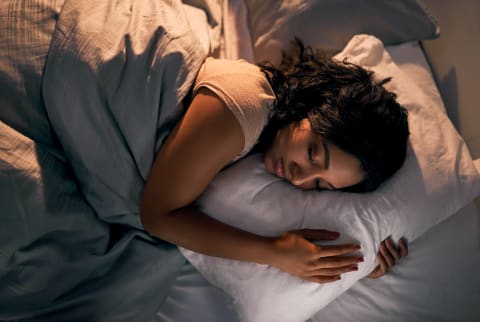Advertisement
Uh, Is Lack Of Sleep Messing With Your Skin? A Derm Explains The Sneaky Link


Beauty sleep: There's a reason the phrase gets dished out in everyday jargon. When you wake from a deep, restful snooze, you may notice your skin looks supple, your eyes look bright, and you sport an allover glow.
The opposite, unfortunately, is also true: When you're up tossing and turning, you may wake up puffy, bleary-eyed, and sallow. But what's the why behind beauty sleep (or lack thereof)?
"I think, intuitively, we know that when our sleep suffers, our skin suffers," board-certified dermatologist Whitney Bowe, M.D., says on the mindbodygreen podcast. "But let's unpack that science."
How your lack of zzz's can lead to dull, congested skin
It has everything to do with cortisol. As you may know, when your cortisol levels are ramped up, your collagen, hyaluronic acid, and lipids tend to suffer; those other processes are put on the back burner in order for your body to focus all its energy on that "fight-or-flight" response. As these three components deplete over time, it can lead to "dermal thinning," where the skin can actually become thinner and less elastic. As a result, your skin barrier weakens, which can kick-start a smattering of concerns—think irritation, dryness, and premature aging.
So, where does sleep come into play? Well, says Bowe, sleep and stress are deeply intertwined. "When the quality or the quantity of your sleep is compromised, especially over time and especially if it's more than one night, that's registered by the body and the brain as stress," she says.
This link between sleep and stress is backed by research, as one study found short sleep duration was associated with perceived stress1 in working adults. Similarly, older research has found that participants limited to only 4.5 hours of sleep a night for one week felt more stressed, angry, sad, and mentally exhausted2.
On another note, your skin shifts into "recovery mode" at night: There's a huge surge in HGH (human growth hormone) in the nighttime sleep cycle, which helps rebuild body tissues3 and spurs increased cell production to replace cells that were damaged throughout the day. If you aren't getting enough sleep, your skin cells aren't regenerating as much during this recovery process. And, thus, there's a buildup of damaged cells, which can make your skin appear dull, dry, and congested.
The takeaway
Sleep and skin health go hand in hand. According to Bowe, your body perceives lack of sleep as stress, which can wreak havoc on your skin barrier. When that barrier is compromised, everything you want to keep housed inside can leak out (read: moisture), and external aggressors can easily slip in.
While one night of tossing and turning likely won't have those long-term effects, chronically poor sleep can totally mess with your skin health over time. Consider this another reason to focus on high-quality shut-eye.